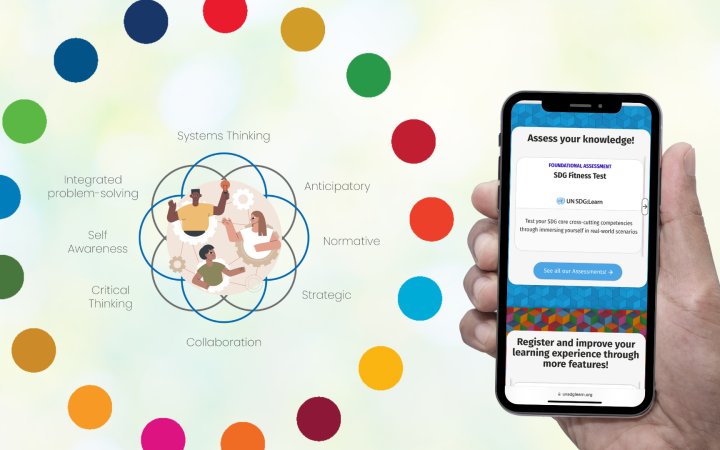26 June 2023, Geneva, Switzerland - Halfway down the road, we still have a long way to go to reach the Sustainable Development Goals by 2030. On some goals, we fell behind due to the COVID-19 pandemic which taught us one important thing: actions and policies cannot be developed in silos. While a wildlife issue can have effects on public health, measures in this area may in turn affect the economy, access to education and other health services and contribute to gender-based violence. They can also have short-term and longer-term effects on the environment – and all this with complex effects across countries, regions and time. Anticipating and understanding the effects of actions across different policy areas and geographies has been a challenge for all: be it a policy-maker, businessperson, care-provider, scientist, civil society advocate or just as an individual. The COVID-19 response has been a glaring demonstration of how important it is for all stakeholders to fully embrace the eight core cross-cutting SDG or sustainability competencies defined by UNESCO - systems-thinking, anticipatory, normative, strategic, critical thinking, self-awareness, collaboration, and integrated problem-solving as an overarching competency.
The COVID-19 pandemic was just one example, but the achievement of the SDGs requires the handling of many other complex issues where these competencies are essential: climate change, food, water and energy systems, gender equality and inclusion of vulnerable groups, peace and justice, global interconnectedness, etc. The intrinsic value of these competencies is in that they can help equip anyone - regardless of professional background or age - with the cognitive, socio-emotional and behaviroual competencies needed to promote sustainability and holistically achieve the SDGs. While these competencies cannot be taught per se, individuals can develop them over their lives while national educational systems - from early childhood education to vocational professional education and higher education - can support individuals in this journey through educational standards, and curriculum, including learning content, methods and environment.
Together with specialized SDG learning objectives, these cross-cutting SDG competencies are a key element of Education for Sustainable Development (ESD). ESD is not only about content, it “asks for an action-oriented, transformative pedagogy, which supports self-directed learning, participation and collaboration, problem-orientation, inter- and transdisciplinarity and the linking of formal and informal learning”. Beyond the knowledge of facts, concepts and procedures, the SDG competencies should enable individuals to pro-actively engage with sustainability-related issues and become sustainability change-makers (UNESCO, 2017).
Raising awareness about the importance of such competencies and demonstrating how in practice learning content and methods can help promote it is a challenge that UNITAR sought to address using innovation and digital technologies. As part of the UN SDG:Learn partnership comprising more than 60 UN and other entities, UNITAR teamed up with UNESCO and other members of the working group on Learning Pathways to develop a free online self-assessment tool “SDG Fitness Test”. The aim of the tool is to enable learners to measure the extent to which they have developed each one of those competencies across cognitive, socio-emotional and behavioural domains. The assessment offers an immersive journey composed of scenarios coming from real-life examples whereby an individual is invited to make choices that serve as a basis for evaluating all 8 competencies. Those individuals who wish to receive the overall score and a detailed report of the level of mastery for each competency are invited to register for free. This assessment is integrated with a UN SDG:Learn recommendations system so that an individual will also be able to consult learning courses and resources on low-scoring competencies and decide on his learning path accordingly. This unique learning recommendations system aims to enable millions of learners around the world to improve their cross-cutting SDG competencies at their own pace. In addition to the SDG Fitness Test, the UN SDG:Learn platform also provides an opportunity to do a more subjective, perception-based self-appraisal of the same competencies using Ubiquity University’s Changemaker Scan and compare the results of the two assessments.
Building on this first step, UNITAR is currently exploring with UNESCO on how to help tertiary and secondary level institutions to mainstream these cross-cutting sustainability competencies in their curricula and operationalize them throughout all subjects and educational programmes from social scientists to engineers and doctors. The sustainability agenda of higher educational institutions needs to expand beyond decreasing environmental footprint and engaging with society to promote a truly transformative education.
For more information and learning services, please visit the UN SDG:Learn platform.


